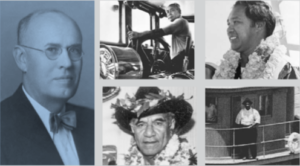Naming the New Tugs: Young Brothers Honors Four Leading Captains
The four new tugs being built for Young Brothers, Ltd., make up the Kapena Class, “kapena,” being the Hawaiian word for “captain.” They are being named for men who made great contributions to the company during their seagoing careers:

The four mariners for whom the tugs are named are, left, Jack Young, and, at right, clockwise from bottom left, Raymond Alapai, George Paniu Sr. and Jr., and William “Bob” Purdy.
Kapena Raymond Alapai joined Young Brothers in 1962 and retired in 2005 after 43 years of service. A quiet man most of the time, he was known for his practical sailing intuition, dependability, aloha spirit and calm demeanor. Whether it was dead calm or blowing 40 knots, Alapai always kept his cool. In one memorable trip, he delivered a tandem tow to Maui in a Kona cyclone without an assist from a second tug.
George Panui Sr. and George Panui Jr. (Single tug named for both men) Kapena George Panui Sr. is known for his unwavering dedication to Young Brothers and his crews as well as his ability to skillfully maneuver a barge. He started out with the company in 1934 as a deckhand, earned his masters license in 1960 and retired in 1975. Kapena George Panui Jr. worked for Young Brothers from 1953 to 2000. He was known for his tireless devotion and skill in dangerous ocean conditions, including Hawaii’s 1960 tsunami, and during an ocean crossing when he battled 40- to 60-foot swells.
Kapena William “Bob” Purdy had 33 years of service with Young Brothers and pioneered the practice of towing two barges with a single tug in 1929. Notably, he was captain of the tug Mamo on its maiden voyage from the Bay Area to Honolulu in 1931, setting a record time of 10 days, 15 hours for the passage while towing two large steel barges with a capacity of 32,000 boxes of fresh pineapple.
